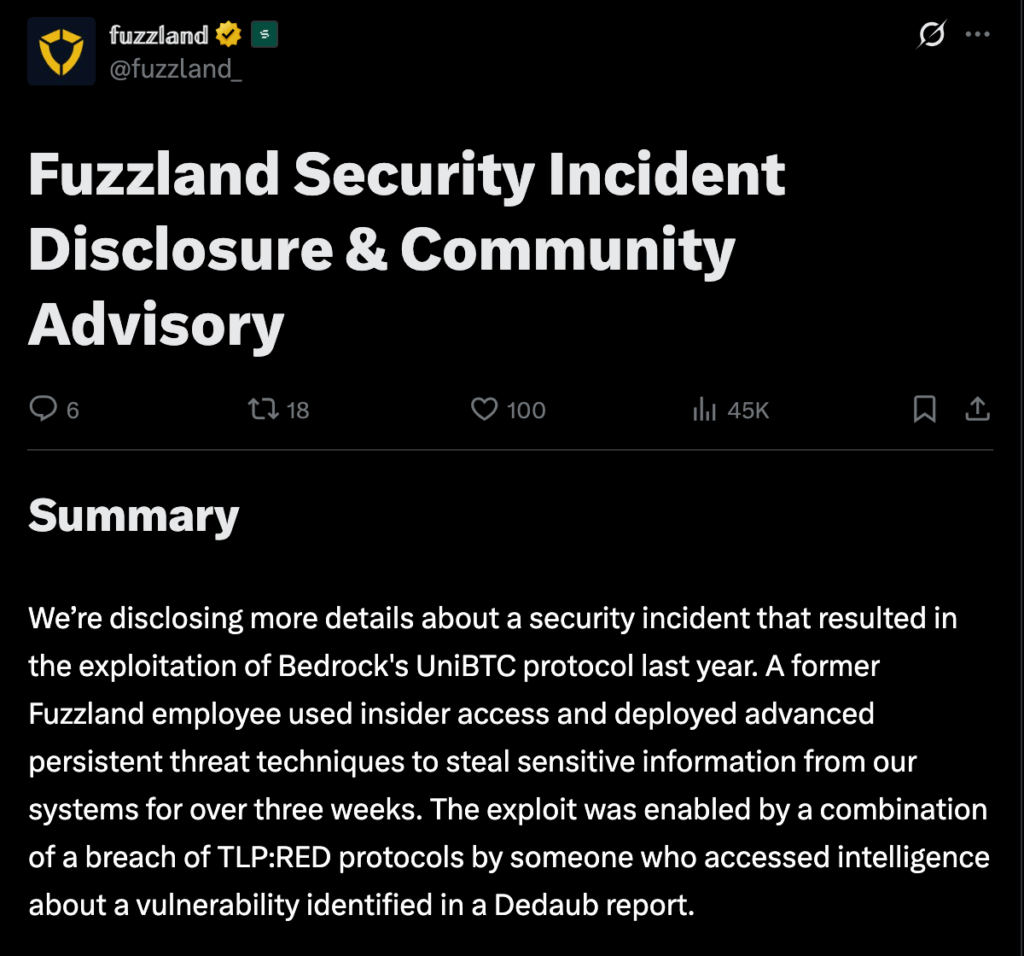BREAKING: Fuzzland Exposes Insider Role in $2M UniBTC Heist at Bedrock
Another day, another crypto hack—except this one stinks of inside jobs and rug-pull déjà vu.
Fuzzland's blockchain sleuths just dropped a bombshell: The $2 million UniBTC exploit at Bedrock wasn’t some shadowy hacker. It was an insider.
The Smoking Wallet
On-chain trails don’t lie. Fuzzland traced the loot to a wallet linked to a Bedrock team member—because who needs external threats when your own devs can reenact ‘Ocean’s Eleven’?
DeFi’s Trust Paradox
Bedrock pitched itself as ‘unhackable’ infrastructure. Cue the world’s smallest violin. The exploit bypassed audits by abusing admin keys—a reminder that code is only as trustworthy as the humans behind it.
Cynical Finance Bonus
Meanwhile, VCs are probably drafting term sheets for ‘insider-exploit insurance’ startups. Innovate or die, right?
 Source: Fuzzland X post
Source: Fuzzland X post
Fuzzland stated that the vulnerability had been identified prior to the exploit, but was ultimately overlooked after being flagged as a likely false positive amid other routine alerts.
Fuzzland said it has reimbursed Bedrock for the $2 million lost in the UniBTC exploit and confirmed it is “working closely with leading security firm and law enforcement” as part of the ongoing investigation.
The smart contract security platform also emphasized that no customer data was exposed, citing its use of separate infrastructure and internal teams. Sensitive information, it noted, is kept “like private keys in TEE.”
On September 27 last year, Bedrock confirmed that it had been exploited which affected its UniBTC product.
The incident spotlights the growing complexity of internal threats in the Web3 security landscape, where even trusted access can become a point of vulnerability. As protocols like Bedrock continue to expand their role in decentralized finance, the need for continuous monitoring, compartmentalized systems, and rapid response mechanisms has never been more critical.
Fuzzland’s swift public acknowledgment, coupled with its collaboration with law enforcement and external security experts, reflects an industry increasingly aware of its accountability—not just to code, but to community trust.
While the broader ecosystem continues to wrestle with evolving attack vectors, the episode serves as a reminder: in decentralized finance (DeFi), transparency and resilience must advance as fast as innovation.
Read More
Michaela has no crypto positions and does not hold any crypto assets. This article is provided for informational purposes only and should not be construed as financial advice. The Shib Magazine and The Shib Daily are the official media and publications of the Shiba Inu cryptocurrency project. Readers are encouraged to conduct their own research and consult with a qualified financial adviser before making any investment decisions.

